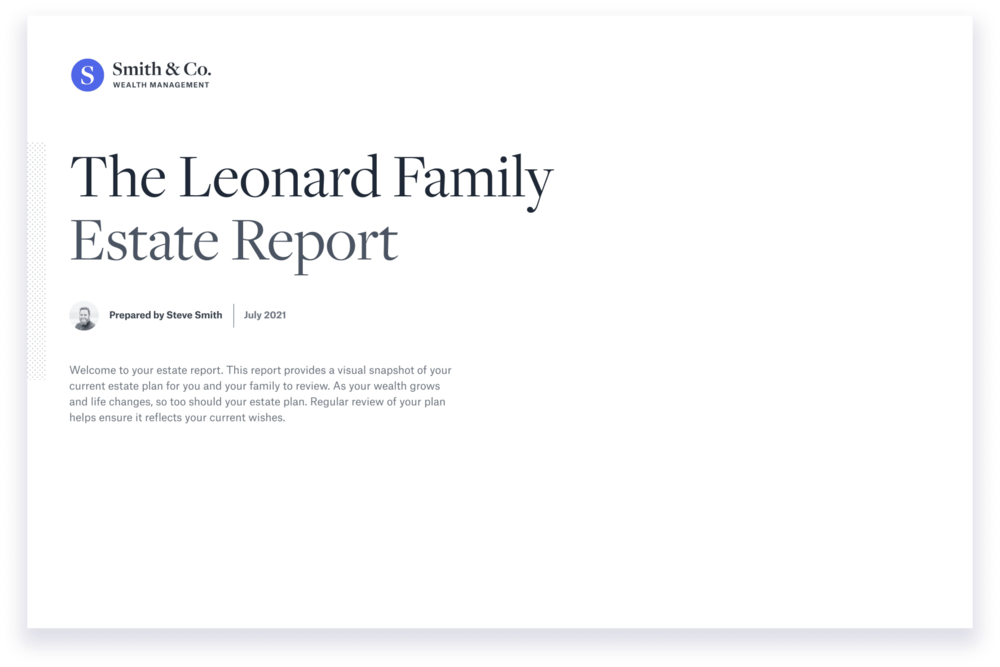 Vanilla
Vanilla
In tough financial times, estate planning is a path to client retention

Financial advisors faced a down wave of change before the pandemic. Over the past year, that wave grew into a tsunami that continues to test advisor-client relationships.
The most resilient firms — those that have retained at least 99% of their clients over the past year — understand the power of prioritizing relationship quality over quantity.
According to a 2020 Price Metrix report from McKinsey, advisors with the highest levels of client retention “have deeper relationships and fewer client relationships.” While they serve fewer households, advisors with low attrition rates manage more accounts per household.
One of the most powerful ways to deepen your relationships with clients is to have proactive conversations about estate planning.
Let’s examine how talking with clients about their estate plan can help you avoid the mistakes that lead to client attrition and drive a more holistic approach to serving clients’ needs.
Why most clients leave (spoiler: it’s not the economy)
Despite the economic downturn straining client relationships, the primary reasons most high-net-worth clients leave their advisors are service-related.
1. Not listening to needs
In a 2020 survey by Natixis Investment Managers, financial professionals ranked “not listening to the needs of clients” as the number one factor that drives clients to seek services elsewhere. Which makes sense: How can you give your clients the best advice for their financial needs if you don’t know what their goals are?
2. Lack of proactive communication
The Natixis survey revealed that 58% of advisors believed their clients would leave if firms failed to “meet client expectations on communications.” Your clients need you to help them prepare for major changes — not only in the market but also in their careers and families.
3. Lack of holistic services
In today’s uncertain world, clients expect advisors to give them and their finances even more attention. A recent report from Accenture shows that clients want advisors to offer guidance about complicated life choices.
“It’s not enough anymore just to be a good portfolio manager,” the report says.“Clients are using their financial advisors as everything from a life coach and family planning expert, to a financial services concierge and relationship manager.”
If your firm isn’t participating in crucial conversations beyond portfolio management, there’s a good chance clients will seek advice and obtain services elsewhere.
4. Not meeting with the client’s family
The client relationship doesn’t end upon the death of a client. If your client leaves behind a spouse or children, they’ll need advice on financial planning. State Street Global Advisors reports: “38% of investors retain the same advisor when their spouse dies. And that number drops to 29% when both parents have passed away and children inherit their assets.”
That number could be bigger, but according to Proactive Advisor Magazine, “75% of clients say their financial advisor has never met their children.” This reveals a major opportunity to build family relationships throughout the lifetime of a client and beyond.
All of the factors above point to estate planning as a simple but powerful solution for creating deeper client connections.
If you want to learn how Vanilla helps you deliver a scalable solution that drives retention, engagement, and creates new growth opportunities at the advisor and institutional level—get in touch.
Why estate planning is the key to keeping clients
Estate planning helps bridge the communication and relationship gap through consistent, proactive messaging about goals and connections with the entire family.
1. Good conversations about estate planning require deep listening
As a financial advisor, you aren’t qualified to provide legal advice to clients about setting up an estate plan. But you’re more than qualified to ask clients about what they want for their families — and to show clients how their current estate plan will get them closer or further away from those goals.
“Affluent clients don’t want to be told what to do, but they do want to be provided with customized options,” says Patricia Abram at ThinkAdvisor, “and they expect advisors to not only understand their specific needs but regularly consult with them as part of providing viable alternatives.”
When talking with your clients about their financial futures, ask them to look beyond their lifetimes: What kind of legacy do they want to leave in the world? These kinds of conversations will leave your clients feeling understood in a more meaningful way.
2. Well-managed estates need regular maintenance (and Communications)
Communicating proactively with clients about their estate plans demonstrates that you have their goals and best interests in mind. It helps you stay top of mind as a trusted advisor who anticipates financial needs beyond investment assets.
Traditionally, advisors ask clients to show them they have an estate plan in place and never revisit the documents again. But if you leave your clients’ estate plans to collect dust in your filing cabinet, you’re doing them a disservice — and you’re missing out on an excuse to provide the proactive communications your clients crave.
Instead, schedule regular reminders for your clients to update their estate documents. Reach out about births and deaths in their families — and how such changes may affect their estates. Alert them to upcoming changes in estate-tax regulations, and advise them to consult with an estate-planning attorney — or refer them to one.
3. Estate plans involve the entire family
The assets you’re helping a client to manage today will probably belong to their relatives after the client’s death. If you take time to discover who these people are and learn their financial goals and challenges, you set yourself up to become a trusted (and indispensable) steward of the family’s generational wealth.
Understanding family dynamics and helping clients to proactively manage their estate can help them avoid conflicts that often tear families apart. Accenture reports that 81% of advisors “hold meetings to help clients navigate complicated family dynamics.”
When you have conversations about estate planning early on and involve a client’s spouse and children in such conversations, you’re showing that you care about their well-being. What better way to earn a client’s trust and loyalty than helping them protect their family?
Vanilla estate reporting helps you build meaningful, long-lasting client relationships
With Vanilla’s estate reporting tools, you can drive critical discussions about your client’s goals and fears for the future. Customized visual reports help you communicate where the gaps are between their goals and their current estate plans. Automated reminders help clients keep their estate documents up to date while keeping your firm top of mind.
By focusing on the individual needs of clients as they face difficulties and milestones, you can become an irreplaceable resource that clients turn to in the toughest of times.
To discover the power of estate planning as a relationship-building tool contact our Sales team to get started or download a sample estate report below to get a glimpse into what our platform can do for you and your clients.

Deepen relationships with all of your clients
https://www.justvanilla.com/demo
This article is for educational purposes only and should not be considered legal advice. If you feel that the information in this article is pertinent to your situation, you may wish to consult a qualified attorney for advice tailored to your circumstances.
Published: Mar 08, 2021
Holistic wealth management starts here
Join thousands of advisors who use Vanilla to transform their service offering and accelerate revenue growth.
